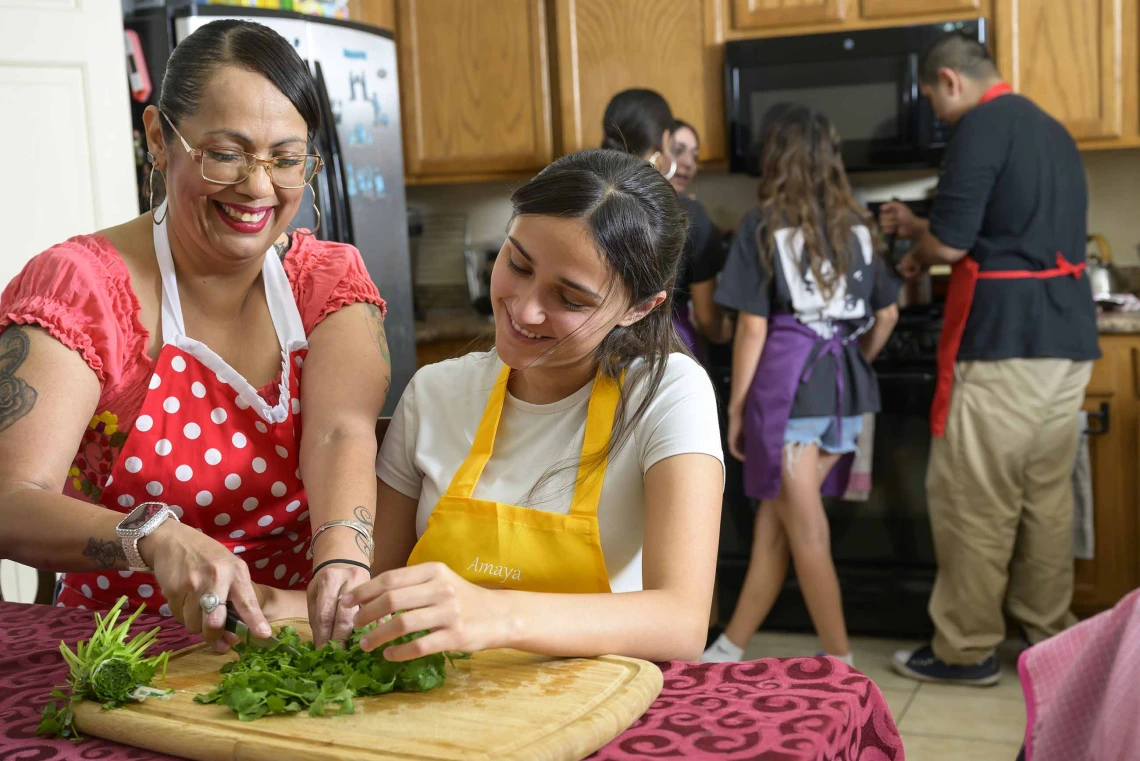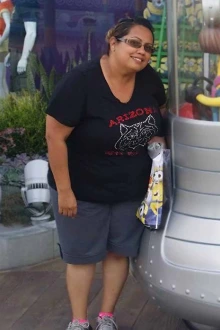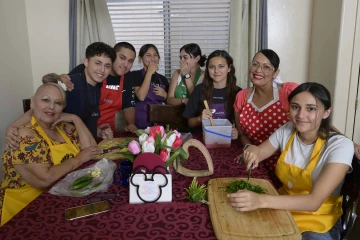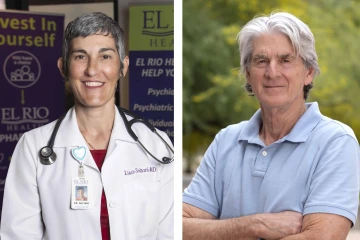Advancing diabetes research and serving an at-risk community
The Center for Disparities in Diabetes, Obesity and Metabolism is focusing on Latino community health while facilitating research through a specialized biobank.

Preparing healthy meals with her family, including niece Amaya Teran, is one of the ways Tina Teran manages her Type 2 diabetes.
Photo by Kris Hanning, UArizona Health Sciences Office of Communications
Tina Teran worked in the Pima County Health Department for 10 years. She knew being overweight could damage her health, but like many people, her attempts at dieting ultimately failed. Then, a medical emergency put things in perspective.

Tina Teran visited Universal Studios in California in 2015, before her 155 pound weight loss journey.
Photo courtesy of Tina Teran
“I was getting headaches every day and feeling dizzy every day for at least a week. I would go to work and not be able to focus because I felt like I was going to throw up,” Teran said. “My manager at the time was a nurse. She took my blood pressure and said it was through the roof and that I needed to go to the emergency room right away.”
At the emergency department, Teran was told she was diabetic and needed an insulin shot to reduce dangerously high sugar levels. For Teran, this was the beginning of a journey to get her health under control.
More than 38 million Americans have diabetes, and 90% to 95% of them have Type 2 diabetes, according to the Centers for Disease Control and Prevention. Research shows that Hispanic people are at a higher risk of developing Type 2 diabetes than many other racial and ethnic groups.
Lawrence Mandarino, PhD, director of the Center for Disparities in Diabetes, Obesity and Metabolism at the University of Arizona Health Sciences, has been researching this condition for decades. The mission of the Center for Disparities in Diabetes, Obesity and Metabolism is to improve the health and well-being of the Hispanic and Latino population while advancing research into diabetes and other metabolic conditions.
The center’s Wellness Bank, or El Banco por Salud, is central to this mission.
Using data to improve health
Type 2 diabetes involves unusually high blood sugar levels and an inability of the body to use that sugar for fuel. If left untreated, complications can include heart disease, vision loss and kidney disease.
Risk factors for Type 2 diabetes include being overweight and inactive, in addition to socio-economic, demographic, environmental and genetic influences. That’s where the Wellness Bank comes in. Its biorepository of blood, DNA specimens and patient data serves as a resource to connect academic researchers and the community.

(From left) Teran’s family: mother Sandra Teran; nephews and nieces Johnny Gonzales, Rene Teran, Neveah Teran, Aminna Teran and Andrea Teran; Teran; and niece Amaya Teran.
Photo by Kris Hanning, UArizona Health Sciences Office of Communications
“Recruitment is open to our Latino patients and their family members,” said Lisa Soltani, MD, MPH, medical director for internal medicine at El Rio Health, one of two Federally Qualified Health Centers that partners with the Wellness Bank. “This partnership allows research to be done in an ethical way so that participants can use the information to improve their health. I know many of my patients are also driven to participate because it’s a way they can help advance scientific knowledge and understanding that could one day benefit them, their families and their community.”
Teran was one of those patients.
“I was not the first person to ignore their health in my family. My mom has a very similar story to how she found out she was diabetic. I lost my sister three years ago, and she had previously suffered a heart attack before finding out she was diabetic,” she said. “I decided right there that I needed to do this. I needed to be an example for nieces, nephews, children and grandchildren. They've lost too much already.”
Teran underwent gastric bypass surgery and lost 155 pounds. She started eating a healthy diet and being more active. When she signed up for a study through the Wellness Bank, she learned another potentially lifesaving piece of information about her health.
“They would monitor my blood pressure, blood sugar and heart rate before and after walking on the treadmill. That’s where I found out I also have an irregular heartbeat,” Teran said. “I had to get a procedure done to make sure I didn’t have any blood clots. I take medication for it now.”
For people with Type 2 diabetes, or metabolic conditions that frequently lead to Type 2 diabetes, participating in the Wellness Bank offers a unique opportunity to explore their health at zero cost to them.
“Participants get all of their lab tests for free, including things like their dietary sugar control, cholesterol control, kidney function, liver function and electrolyte levels,” said Soltani. “I review each of these lab tests and it is not infrequent that I find that they do have diabetes, or out-of-control blood pressure or kidney failure. This partnership allows us to immediately follow up with them.”
Researchers and doctors benefit from increased knowledge of social and biological factors leading to poor glucose control with an emphasis on the implementation of pharmacogenomics clinical decision support.
Tracking diabetes through time
Mandarino created the Arizona Insulin Resistance Registry, a precursor to the Wellness Bank, in the Phoenix area in the early 2000s.
“We were able to collect biospecimens and data from hundreds of people in the community that are still being used by researchers today, but we also learned some valuable lessons about things we wanted to do differently,” Mandarino said. “Many of our participants did not have health insurance or a primary care doctor. We realized we needed a community partner that could explain the results of different lab tests and follow up with a treatment plan if needed.”

(From left) Lisa Soltani, MD, and Lawrence Mandarino, PhD, are collaborating to advance diabetes research and improve Latino community health through the Wellness Bank biorepository.
Photos by Kris Hanning & Noelle Haro-Gomez, UArizona Health Sciences Office of Communications
Mandarino went on to accomplish this partnership with a second Phoenix area biobank named Sangre por Salud. In 2016, he established a third biobank, the Wellness Bank, at the University of Arizona Health Sciences in Tucson. The Wellness Bank partners with El Rio Health and the Mariposa Community Health Center to recruit participants who self-identify as Hispanic or Latino.
The Wellness Bank and its stores of data have helped facilitate dozens of studies. Researchers can access participant blood samples and also retrieve details about lifestyle and eating habits. Study objectives range from searching for a link between mental health and diabetes, to assessing the association between breastfeeding and metabolic syndrome, to exploring diet interventions for food insecure adults.
“In one study, we asked participants on three different days if they had eaten any fruit or vegetables that day and scored them on a healthy-eating index,” Mandarino said. “We found that low scores were associated with people who also noted that they sometimes did not have enough money to buy food. This is one example of how someone could have a genetic risk factor for Type 2 diabetes, and then socio-economic factors can have an additive effect.”
Teran says the Wellness Bank was a key part of her path to better health, and she is happy her participation might advance science and research geared to help her community.
“I am so proud of my heritage, and I have always stood up for my family and community,” she said. “I am honored to do this for them.”
Experts
Lawrence Mandarino, PhD
Director, Center for Disparities in Diabetes, Obesity and Metabolism, University of Arizona Health Sciences
Professor, Department of Medicine, College of Medicine – Tucson
Chief, Division of Endocrinology, Diabetes and Metabolism, College of Medicine – Tucson
Contact
Brian Brennan
UArizona Health Sciences Office of Communications
520-621-3510, brianbrennan@arizona.edu

